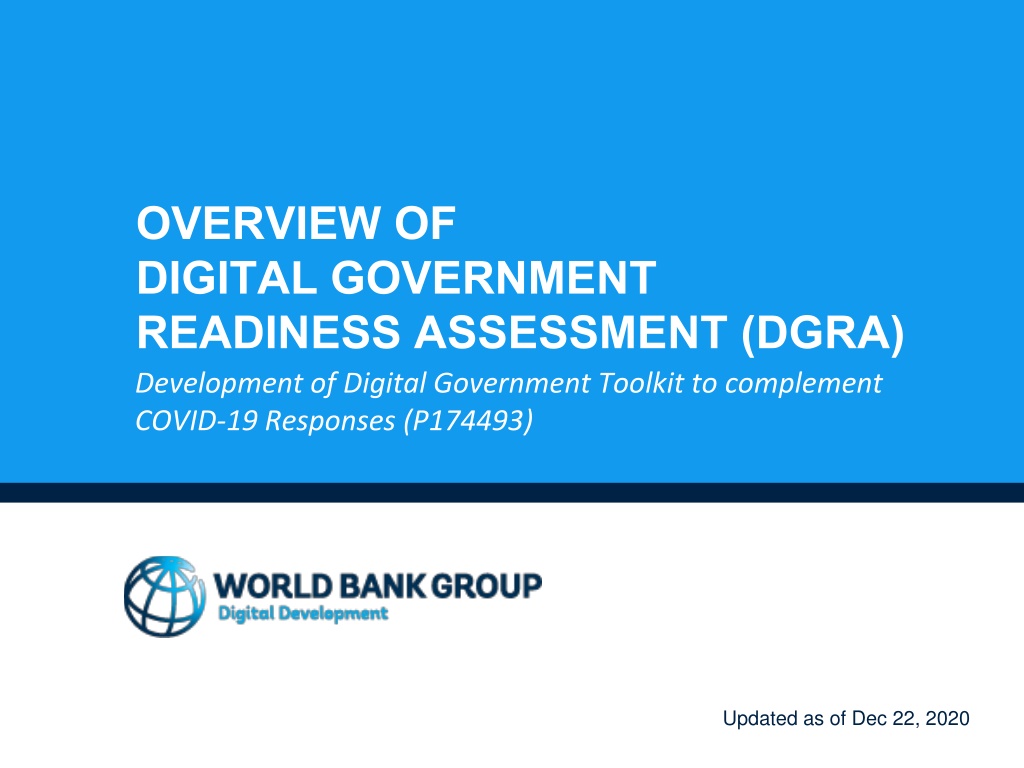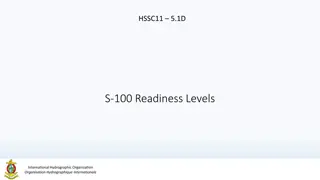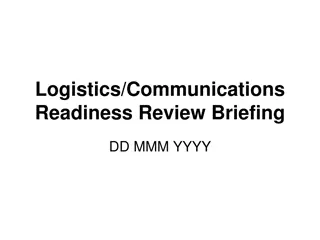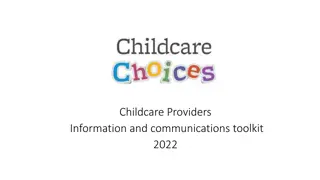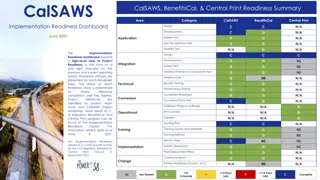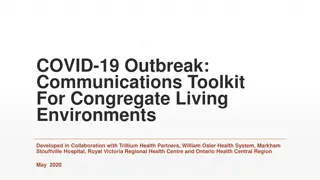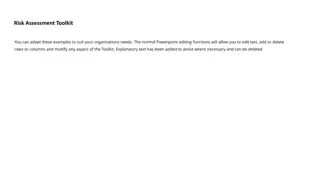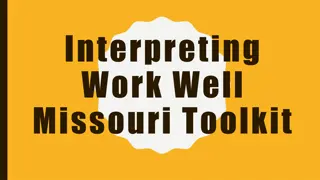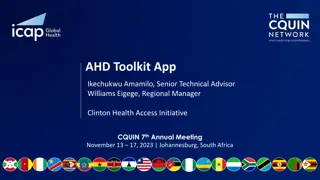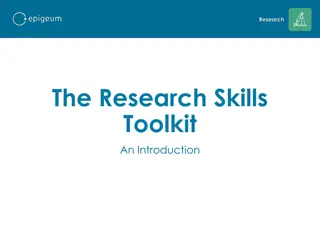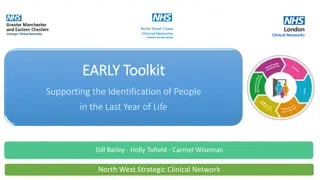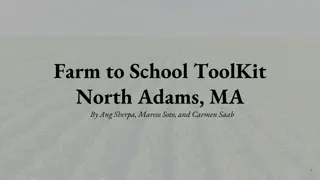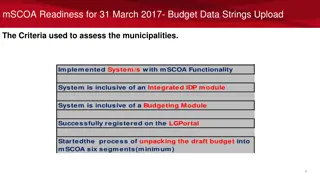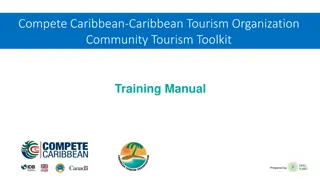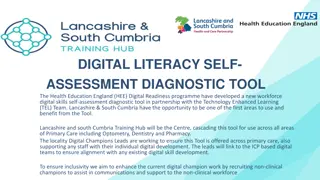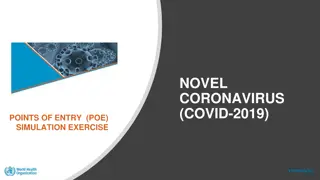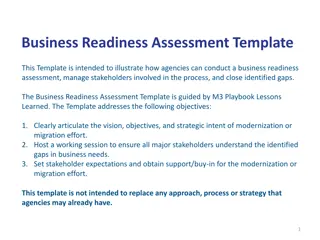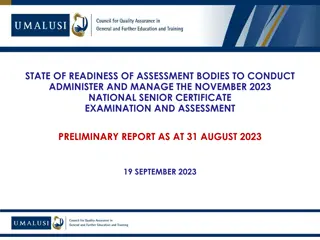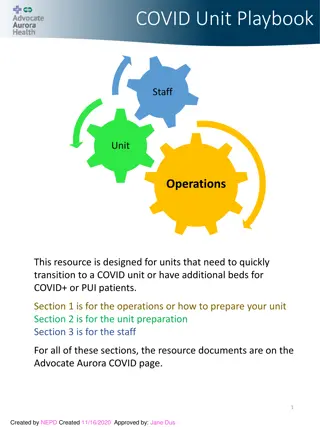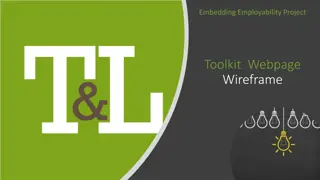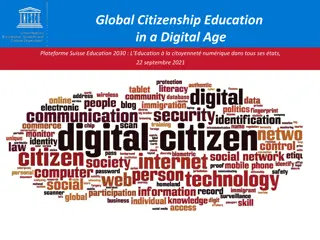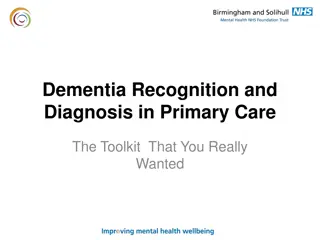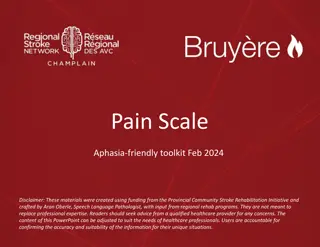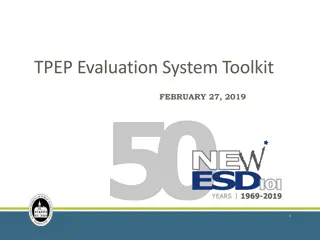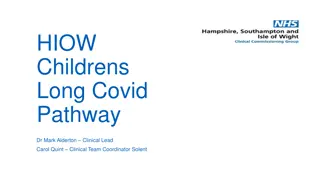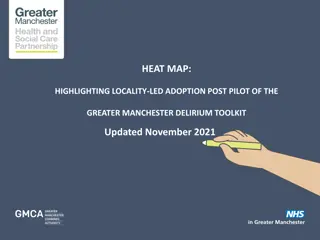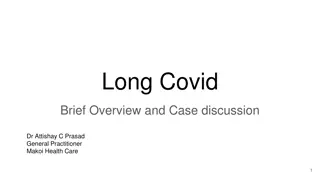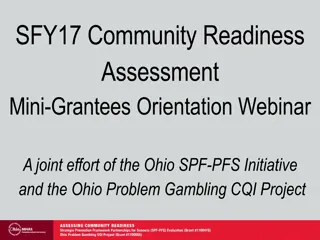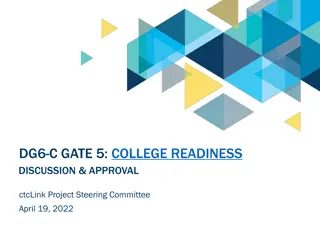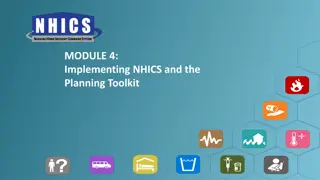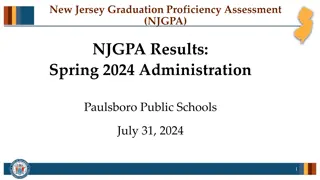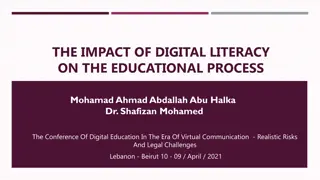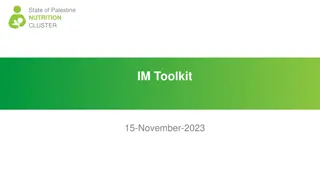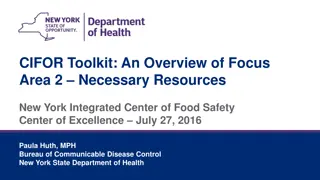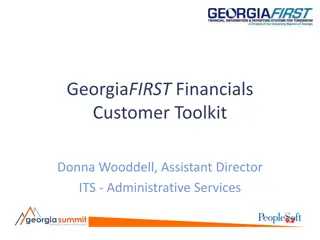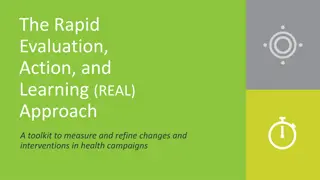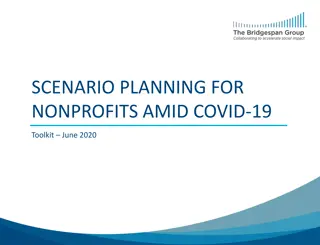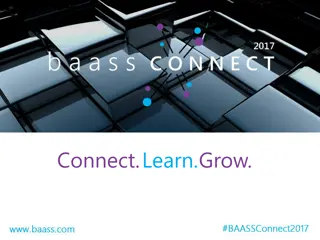Overview of Digital Government Readiness Assessment and Toolkit for COVID-19 Responses
The Digital Government Readiness Assessment (DGRA) consists of 9 pillars and 67 questions, aiming to assist governments in understanding their digital transformation journey. The assessment focuses on areas such as leadership, user-centered design, technology infrastructure, cybersecurity, and legislation. It is not meant to rank governments but to identify factors influencing the adoption of best practices. The DGRA toolkit includes an Excel version and an online web-tool, providing a qualitative rating for diagnostic purposes. Several country assessments have been completed, highlighting success stories like Vietnam.
Download Presentation

Please find below an Image/Link to download the presentation.
The content on the website is provided AS IS for your information and personal use only. It may not be sold, licensed, or shared on other websites without obtaining consent from the author. Download presentation by click this link. If you encounter any issues during the download, it is possible that the publisher has removed the file from their server.
E N D
Presentation Transcript
OVERVIEW OF DIGITAL GOVERNMENT READINESS ASSESSMENT (DGRA) Development of Digital Government Toolkit to complement COVID-19 Responses (P174493) Updated as of Dec 22, 2020
What is DGRA DGRA is designed around the following principles: The assessment consists of 9 pillars and 67 questions, and is provided in the form of Excel and online web-tool (English, French, Spanish version available) The assessment provides rating on a qualitative scale for diagnostic purposes and highlight the most important areas for actions The assessment is intended to help the clients generate shared understanding and consensus among key stakeholders about government priorities and constraints of their digital transformation journey The assessment process is intended to raise awareness of the digital transformation process, not just to collect information and evidence from the client The assessment is not intended to rank the governments The assessment intends to find the key factors which incentivize or constrain the adoption of best practices 1
What is DGRA (continued) The framework of DGRA methodology is derived from research into international best practice in digital government field and the views of international experts. The assessment examines 9 sections with 67 questions: Leadership and Governance (9 Questions) User-Centered Design (8 Questions) Public Administration and Change Management (6 Questions) Capabilities, Culture and Skills (7 Questions) Technology Infrastructure (10 Questions) Data Infrastructure, Strategies, and Governance (8 Questions) Cybersecurity, Privacy and Resilience (4 Questions) Legislation and Regulation (8 Questions) Digital Ecosystem (7 Questions) Example of Questionnaire Each question has 4 response options and, depending on the response, some questions branch out to second-level questions 2
Current DGRA Portfolio COMPLETED DGRA BY REGIONS/COUNTRIES AS OF FY21 4 4 DGRA has not been conducted in LAC & SAR yet 3 The country assessments with asterisk(*) have been completed through desk research and other project document studies, without client engagement using DGRA tool Vietnam DGRA is seen as one of the success stories; it was conducted by both DGRA and ODRA in 2018 in coordination with Governance GP in the Vietnam office. As a result of DGRA s baseline study and follow-up, WB suggested Cloud Computing Assessment ASA to the client in FY21 1 0 0 ECA MENA EAP SSA LAC SAR Senegal Vietnam Cambodia* Myanmar Kyrgyz Rep. Uzbekistan Moldova* Serbia* Lebanon Tunisia* Burkina Faso West Bank & Gaza 5
Overview of DGRA for COVID-19 Development Objective To better capture the needs for the government's continuity in pandemic by adding a crisis/emergencies preparedness specific pillar to embed an aspect of digital resilience assessment To develop an accessible, user-friendly online toolkit to help pilot governments identify priority areas for post-pandemic/crises digital government strategy To disseminate technical knowledge of building sustainable resilient solutions in digital government. Knowledge Dissemination & Capacity Building Pilot Test Revamp DGRA Methodology Create a new emergencies/crises preparedness dedicated pillar Update existing pillars by streamlining and/or adding questions to align with the new DO Develop external online web-service and enhance DGRA data dashboard to increase accessibility and usage Validate the effectiveness of revised methodology in two pilot countries Potential countries include Peru, Maldives, and Uzbekistan Arrange a series of virtual knowledge dissemination and capacity building activities such as internal/external workshops and seminars in collaboration with NIA Partner with National Information Agency (NIA) in Korea Close consultation with Hired Firm Coordinate with WB GFDRR Labs, WHO, etc 6
Overview of DGRA Online Web-Service Enhancement Plan DGRA Intranet FURL: dgratool/ In collaboration with WB ITS, DGRA internal online web-service was launched in Feb 2019, and the team had given training sessions to the staff through DDP Speak Series Currently 12 assessments are archived in the database Several knowledge activities, such as production of task team guidelines, OLC, and others around the online web-service, have been conducted. However, there are limitations in accessibility, interactive capabilities and the application of dashboard results to the projects. DGRA Dashboard & Data Visualization Information Source Open Data & Knowledge Sharing Repository Utilize as baseline studies and resources for clients, GPs, other stakeholders Excel Sheet DGRA Database Tableau, MS Power BI OR Resources for comparative studies of the regions/countries Internal Online Web-Service Deposit Data in WBG Microdata Library OR *currently 12 assessments are archived NIAT s Technical & Analytic Value Knowledge activities including webinars, DD Notes, others External Online Web-Service 7
OVERVIEW OF ENTREPRENEURIAL TALENTS HOUSE OF OPPORTUNITIES AND SUPPORTS PROGRAM (ETHOS II) Digital Skills Development for ICT Entrepreneurs in Developing and FCV Countries (P168424) Updated as of Dec 22, 2020
What is ETHOS Entrepreneurial Talents House of Opportunities and Supports (ETHOS) program, established in 2015, is a highly selective program which aims to promote and support technology-based entrepreneurship in developing countries for social and economic development ETHOS is a milestone contributing a part in building an ecosystem for ICT entrepreneurship It supports young entrepreneurs across developing countries to turn their ideas into actual business model with a special focus on ICT application in business development It covers all-expenses, providing opportunities to learn digital skills, enhance entrepreneurial mindsets and expand its technical and practical knowledge through mentorship, lectures, workshops, business networking, etc. 9
History of ETHOS Program ETHOS I Phase 2 (2016) Participants 29 selected participants from 7 countries (Bulgaria, Romania, Indonesia, Bangladesh, Mongolia, Vietnam, Algeria) Phase 1 (2015) Participants 10 Entrepreneurs from Bangladesh 10 Entrepreneurs from Vietnam 3 Observers form Pakistan 2 weeks program with networking, mentoring & presentation coaching, business gallery exhibition, demo-day and post-training program Program 3 weeks program with lectures, mentoring, business gallery exhibition and Demo-day Program ETHOS II (Virtual) Main Program (2021) TBC Pilot Program (2020) Participants 3 countries (Cambodia, Myanmar, Sri Lanka) 5 weeks program with a focus on virtual individual mentoring, networking with ETHOSI alumni, business gallery in online website Program 10
V-ETHOS: Main Program Component Confirmed Countries: Ethiopia, Rwanda, Cote d Ivoire, Lebanon, Cameroon and Jordan A Prelude to Startups (1week) Orientation Welcome message (Worldbank HQ, Worldbank Korea, President of SUNY Korea, Born2Global) Program introduction Who s Who Session By country, by the region and altogether ICT and Entrepreneurship Knowledge Series CTO Lectures focusing on ICT application to start-ups (Tech-venture CTOs) Entrepreneur Lectures focusing on Start-up after COVID-19 (SparkLabs/D-camp) Entrepreneurship and sustainable development (Webinar) Sharing prosperity through technology partnership (Webinar) B Building your business (2weeks) Next Step Follow-up (TBD) Mentoring Session : Refining your ideas into business planning Tech Partnership Session : Digital solutions network building 1. 2. 3. Selecting finalist for Songdo Program Startup Process Analysis (SPA) Preparing for Songdo Program C Financing your business (2weeks) Examining your investment needs Producing the 5 pitching Business Gallery Demo / Pitching day
v- ETHOS: Timeline (draft) Feb. 8 Mar. 25 Apr. 5 Mar. 19 Mar. 22 - Apr. 2 v-ETHOS Platform Development Application Deadline Main Session Promotion Start Selection Process Final Announcement Apr. 10 Apr. 19 - May. 21 Dec - Jan 2022 Apr. 13 - 15 Mar 2022 v-ETHOS Handbook Program Review Inbound Session Orientation SPA Report Prelude to Startups Apr. 19 23 Building your business Apr. 26 May. 7 Financing your business May. 10 21 12
v- ETHOS: Weekly Schedule (draft) 1st week Apr.13-15 Apr.20 Apr.21 Apr.22 Apr.23 Lecture series CTO Lectures focusing on ICT application to start-ups (Tech-venture CTOs) (90mins) Lecture series Entrepreneur Lectures focusing on Start-up after COVID-19 (SparkLabs/D-camp) (90mins) Webinar Entrepreneurship and sustainable development (50mins) Webinar Sharing prosperity through technology partnership (50mins) Orientation (by cluster) 13
v- ETHOS: Weekly Schedule (draft) 2nd Week Apr.26 Apr.27 Apr.28 Apr.29 Apr.30 Mentoring session 1 (Regional Cluster 1) (60mins) Mentoring session 1 (Regional Cluster 2) (60mins) Mentoring session 1 (Regional Cluster 3) (60mins) Tech Partnership session 1 (Regional Cluster 1) (50mins) Tech Partnership session 1 (Regional Cluster 2) (50mins) Tech Partnership session 1 (Regional Cluster 3) (50mins) Mentoring session 2 (Regional Cluster 1) (60mins) Mentoring session 2 (Regional Cluster 2) (60mins) Tech Partnership session 2 (Regional Cluster 1) (50mins) Tech Partnership session 2 (Regional Cluster 2) (50mins) Feedback / Roundtalk Mentoring session 2 (Regional Cluster 3) (60mins) Tech Partnership session 2 (Regional Cluster 3) (50mins) Mentor Partners Tech Partners WorldBankGroup KOREA Office, UNOSD, CNTTECH, Born2Global, D.camp, Headstart, Nanuhm Angels, theventures, Korea entrepreneurship foundation, KOICA Innoport, InForIntelligence, 500 Software convergence cluster Songdo SSenStone, Spiceware, Alink, Hexlant, Skelter Labs, bitsensing, VOGO, security platform, ALT- A, ,FaceTag, NEOSAPIENCE, pulse9, OPENUB, Inforall, Advanced Energy 14
v- ETHOS: Weekly Schedule (draft) 3rd Week May.3 May.4 May.5 May.6 May.7 Mentoring session 3 (Regional Cluster 1) (60mins) Mentoring session 3 (Regional Cluster 2) (60mins) Mentoring session 3 (Regional Cluster 3) (60mins) Tech Partnership session 3 (Regional Cluster 1) (50mins) Tech Partnership session 3 (Regional Cluster 2) (50mins) Tech Partnership session 3 (Regional Cluster 3) (50mins) Mentoring session 4 (Regional Cluster 1) (60mins) Mentoring session 4 (Regional Cluster 2) (60mins) Tech Partnership session 4 (Regional Cluster 1) (50mins) Tech Partnership session 4 (Regional Cluster 2) (50mins) Feedback / Roundtalk Mentoring session 4 (Regional Cluster 3) (60mins) Tech Partnership session 4 (Regional Cluster 3) (50mins) Mentor Partners WorldBankGroup KOREA Office, UNOSD, CNTTECH, Born2Global, D.camp, Headstart, Nanuhm Angels, theventures, Korea entrepreneurship foundation, KOICA Innoport, InForIntelligence, 500 Software convergence cluster Songdo Tech Partners SSenStone, Spiceware, Alink, Hexlant, Skelter Labs, bitsensing, VOGO, security platform, ALT- A, ,FaceTag, NEOSAPIENCE, pulse9, OPENUB 15
v- ETHOS: Weekly Schedule (draft) 4th Week May.10 May.11 May.12 May.13 May.14 Business Gallery 1 (Regional Cluster 1) Business Gallery 2 (Regional Cluster 1) Business Gallery 1 (Regional Cluster 2) Business Gallery 2 (Regional Cluster 2) Program Interim Review ETHOS Alumni day Pitching Prep. Business Gallery 1 (Regional Cluster 3) Business Gallery 2 (Regional Cluster 3) 16
v- ETHOS: Weekly Schedule (draft) 5thWeek May.17 May.18 May.19 May.20 May.21 Pitching day 1 (Regional Cluster 1) Pitching day 2 (Regional Cluster 1) Review and Feedback session Pitching day 1 (Regional Cluster 2) Pitching day 2 (Regional Cluster 2) ETHOS Roundtalk Pitching Prep. Pitching day 1 (Regional Cluster 3) Pitching day 2 (Regional Cluster 3) 17
